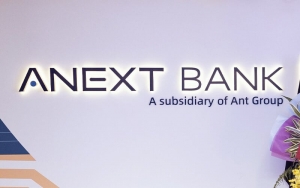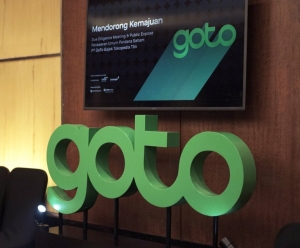Asia Banking Research
Chinese fintech giant Ant Group announced the soft launch of its Singapore digital bank ANEXT with fanfare earlier this month. The announcement came nearly three years after the Monetary Authority of Singapore (MAS) said it would issue up to five digital banking licenses. Now that ANEXT has finally gone live, it is worth assessing its prospects. The bank holds a digital wholesale banking (DWB) license, which allows it to serve non-retail customers only. ANEXT plans to develop an open framework for financial institutions together with MAS-backed Proxtera, a hub connecting B2B marketplaces, trade associations and service providers. While Ant has high hopes for ANEXT’s potential to serve SMEs in Singapore, it is likely to face some significant challenges in the city-state’s ultra-competitive financial services market.
Is GoTo on the right track?
Asia’s platform companies had a great run, but amid a shaky global economy they have no choice but to make substantive changes to their business models. For most of these companies, the biggest problem is that they do not make enough money to offset their costs. Until very recently their primary focus was on user numbers rather than profitability. Indonesia’s GoTo, despite some strong fundamentals working in its favor, probably will have to undergo a painful transition if it expects to thrive in the long term.
The sky may be the limit for Philippine digibanks
While digital banks are all too often hyped, in the Philippines’ case online lenders truly have a large market opportunity. Incumbents have limited reach and there is a large unbanked population, estimated at 47% of adults (31.5 million people) as of early 2021 by Bangko Sentral ng Pilipinas (BSP), the Philippine central bank. Of the 53% with bank accounts, there is undoubtedly a considerable underbanked population. The Philippine digibank Tonik reckons that the country’s retail savings market is valued at up to US$140 billion and its unsecured consumer lending market at US$100 billion.
Will digital banks be disruptive in Thailand?
In August 2021, The Bangkok Post ran an article entitled “Thailand ripe for a digital banking battle” that captured the conventional wisdom about the prospects for online lenders in the kingdom, which is that there is a significant market opportunity for them due to lagging digitization among incumbents rather than the existence of a significant unbanked population. About 82% of Thais have a bank account, though by one estimate 48% of the population is underserved. Yet the opportunity for digital banks could be shrinking as big traditional lenders accelerate digital transformation and the government introduces real-time retail payments possible with only a mobile number.
The digitization of financial services in Taiwan has dovetailed with rising online scams, but compared with many other economies, Taiwan did not experience a surge in such illicit activity for most of the pandemic. The reason is that Taiwan adhered to a de facto zero-Covid policy that kept infections down for more than two years. It was only in the past few months when the hyper-infectious omicron variant penetrated Taiwan’s defenses amid a wobbly global macroeconomic environment that online financial crime began to skyrocket.
P2P lending in Indonesia has a way forward
Slowly but surely, peer-to-peer (P2P) lending is becoming a sustainable and regulated industry in Indonesia. A recent regulatory crackdown aimed at consolidating the sector into a smaller number of compliant, above-board firms has borne fruit. Unlike China, Indonesia has decided that P2P lending can serve a legitimate financial inclusion role. Having the benefit of hindsight, Jakarta moved to proactively regulate P2P lending.
Hong Kong’s virtual banks arrived at a tumultuous time in the city, facing the twin challenges of political tumult and Covid-19. However, the pandemic may have helped spur greater uptake of the online lenders’ services, especially now that Hong Kong has experienced a more severe Covid wave. Important questions remain though: How big is the opportunity in a city of 7. 4 million where 93% of people over 14 have a bank account? And is it realistic to assume that expansion to the mainland will be possible?
It is a testament to the difficulty of establishing a viable international financial center in Asia that so many first-tier cities in the region are vying to compete with Hong Kong yet none is truly a peer competitor. Even Singapore, undoubtedly the most important fintech hub in Southeast Asia if not the entire region, cannot match Hong Kong in the capital markets space. Seoul is the latest Asian city to throw its hat in the ring to become a global financial center.
On April 29, Bank Negara Malaysia (BNM) awarded digital banking licenses to five consortia primarily led by large tech firms and incumbent financial institutions. The one exception was a consortium that includes Grab and Singtel and is co-led by Kuok Brothers, a massive conglomerate that focuses on real estate, shipping and agribusiness, among other things.
Indonesia’s digibanking sector continues to be among the busiest in Asia Pacific with a flurry of deals in recent weeks. Key deals include buy now pay later (BNPL) firm FinAccel’s purchase of a majority stake in PT Bank Bisnis Internasional and SME financing platform Funding Societies and used car marketplace Carro investing an undisclosed amount in Bank Index Selindo (Bank Index). Indonesian peer-to-peer lender Amartha is also reportedly in talks to acquire 70% of local bank PT Bank Victoria Syariah.
More...
The Philippines now has two fintech unicorns
One good unicorn deserves another. Just five months after the Philippines minted its first fintech unicorn – and indeed first private company to hit a US$1 billion valuation – it has produced another. While the first unicorn was Alibaba-backed Mynt, operator of the GCash e-wallet, the latest one is Tencent-backed Voyager Innovations, which operates the digital wallet PayMaya.
Digital banks tend to lose money in their early years of operation. It is usually not a question of if, but how much. In the case of Taiwan’s banks, the losses are sufficient to potentially require an increase in capitalization. Line Bank lost almost NT$2.3 billion (US$78.7 million) in about one year of operation while Rakuten Bank lost NT$705 million (US$24.1 million).
How are Mynt's prospects shaping up?
Ant Group and Globe Telecom-backed Mynt was the Philippines' one and only unicorn until April 12 when Voyager hit the milestone. Mynt reached the status last November after raising US$300 million from global investors including Warburg Pincus and Insight Partners. Mynt made good on its promise to become a “double unicorn” by reaching a US$2 billion valuation. While its long-term prospects in the vastly underbanked Philippines look good, questions remain about Mynt’s business model and the timing of an eventual IPO.
Australia’s casino gaming sector has long had lax money laundering controls. However, historically, Australian banks have borne the brunt of regulatory ire for money laundering breaches. Both Commonwealth Bank of Australia and Westpac have paid massive fines for such violations in recent years. However, with AUSTRAC launching a probe into Crown Melbourne and Crown Perth on March 1 and allegations emerging later in the month that the Star Entertainment Group laundered money in Macau, the casino gaming sector is likely to come under much greater scrutiny.














